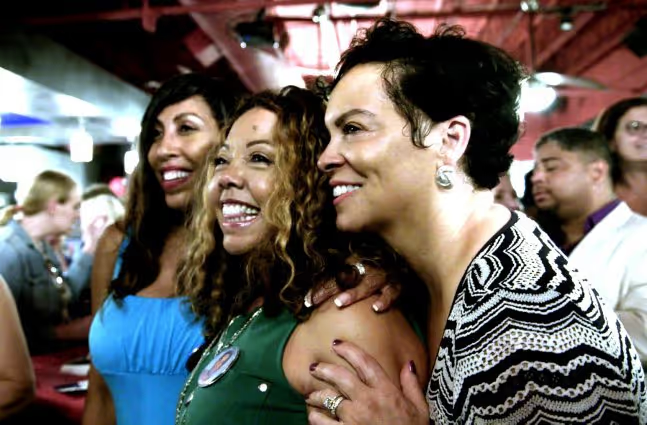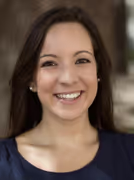And She Could Be Next (Episode 1): The New American Majority Film Clips
Film Clips

Clip 1: Rashida Tlaib: Running, Not Hiding (0:07:14 - 0:08:25, length: 1:11)
The clip begins at 7:14 from the start of the documentary. Rashida Tlaib explains how a personal experience with Islamophobia in America motivated her to run for office. The clip ends at 8:25.
Rashida Tlaib shares a personal story about how witnessing the impact of rampant Islamophobia on her children fueled her decision to run for office. The audience listens as Tlaib shares how her identity as a loud, female, Palestinian Muslim has led others to shut her out of political opportunities and leadership roles. She insinuates that a major shift is afoot in American politics, and encourages the diverse audience to consider the gravity that the contemporary political moment holds for new leadership.
Clip 2: Black Women: Always a Political Force (0:13:50 - 0:17:50, length: 4:44)
The clip begins at 13:40 with Nse Ufot, Executive Director of the New Georgia Project, addressing a crowd of potential voters at a “United We Vote” rally in Atlanta, Georgia. It ends at 17:50 when GLOW VOTE organizers affiliated with the Stacey Abrams campaign are shown canvassing in Georgia neighborhoods.
Artists, activists, performers, and political organizers come out to a United We Vote rally in Atlanta, Georgia to demonstrate support for Black gubernatorial candidate Stacey Abrams. Nse Ufot, the Executive Director of the New Georgia Project, describes how Georgia represents the shifting demographics of the United States—the “New American Majority”—noting that Georgia is set to become the first white-minority state in the deep south. With a group of Black women organizers, Ufot discusses the historic role Black women have played as political educators, leaders, and organizers, and how their experiences and knowledge can inform the electoral strategies of the multiethnic, multiracial New American Majority.
Clip 3: Lucy McBath: Channeling Profound Loss to Win (0:19:59 - 0:22:05, length: 2:09)
The clips begins at 19:59 with Lucy McBath describing how the impact of racist gun violence (specifically, her son’s murder) activated her journey into electoral politics. It ends at 22:05 with McBath reflecting on the need for political action both outside of and inside of institutions.
Lucy McBath explains that before her son was shot and killed by a white man for listening to music too loud, she used to presume that being middle class would shield her from racist violence. She then describes the difficulty she had telling her story -- and more specifically, getting people to listen. McBath talks about how her painful journey caused her to re-examine the political legacy of her father, a Black activist. She emphasizes the urgency of political progress through official “inside” channels, such as winning elections and passing laws, as well as “outside” channels, such as grassroots organizing, activism, education, and voter registration.
Clip 4: María Elena Durazo: Running, and Winning, With Workers (0:26:05 - 0:27:53, length: 1:49)
The clip begins at 26:05 with a compilation of scenes from María Elena Durazo’s campaign. It ends at 27:55 at the close of Durazo’s address to Latinx union activists.
California state senate candidate María Elena Durazo campaigns in the majority-Latinx community she is running to represent. Durazo attends a political rally organized by a group of Latinx union activists and other multiracial, multiethnic community members. A union organizer and hotel worker delivers a poignant speech about the urgent need to change the face of political leadership, especially for working class immigrants. Durazo explains the political imperative to motivate disengaged members of the Latinx community to vote in a system that encourages apathy.
Clip 5: Bushra Amiwala: Running Against the Terror of Fear (0:33:28 - 0:35:00, length: 1:40)
The clip begins at 33:26 when Bushra Amiwala takes the stage at a fundraiser organized by the local Pakistani Muslim community in Skokie, Illinois. It ends after Amiwala closes her address with the powerful line, “We don’t have to be victimized first to be leaders.”
Bushra Amiwala speaks to a group of Pakistani community members about how her experience with Islamophobia informs her political goals and desire to run for office. She shares a story of a school project that led her to discover the prevalence of fear-laden stereotypes that people in her community held against Muslims, who they associated with terrorism. As the members of the audience absorb her words with painful recognition, Amiwala closes her address by saying, “We don’t have to be victimized first to be leaders.”
Clip 6: Stacey Abrams: Running a Historic, Coalition-Based Campaign (0:56:02 - 1:02:30, length: 6:34)
The clip begins at 56:02 with a screen that reads: GEORGIA. It ends at 1:02:30 with a Filipino DACA recipient on the Abrams campaign describing the invisibility of being undocumented as an Asian American.
Stacey Abrams talks about the challenges--and historic significance--of being a black woman candidate for governor in Georgia. She describes how the experiences she’s had and accomplishments she’s achieved as a Black woman are indicative of the abundance of skills she brings to political office. A racist and xenophobic political ad run by her opponent, gubernatorial Republican candidate and then-Georgia Secretary of State Brian Kemp, is shown. Nse Ufoh describes the highly problematic circumstances and actions that surrounded the race, including Kemp’s role as Secretary of State in purging nearly 1.25 million voters from the Georgia voter rolls. Representatives from Abrams’ multiracial and multiethnic coalition of organizers discuss why they are working on her campaign.
Clip 7: Running in a Racist Race: Election Day Hurdles (1:37:00 - 1:38:49, length: 1:54)
The clip begins at 1:37:00, with a screen that reads: GEORGIA. It ends with a Georgia organizer explaining why there is no such thing as “voter apathy.”
As the election draws near, polling places in Georgia communities of color are targets for closure. As many as 80% of the polling locations in predominantly Black Randolph County are closed for dubious reasons, raising suspicion of widespread and systematic attempts at voter suppression. The New Georgia Project responds by organizing petition campaigns to force re-opening of polling places, using media to amplify their message and raise red flags, and securing legal counsel to fight voter suppression in court.

